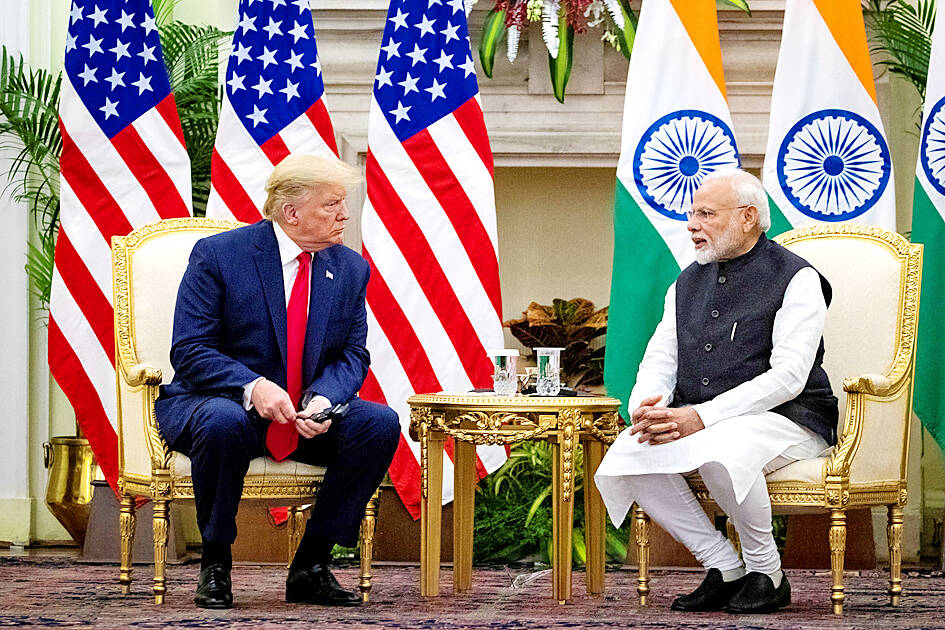Indian Prime Minister Narendra Modi is preparing additional tariff cuts ahead of a meeting this week with US President Donald Trump that could boost US exports to India and avoid a potential trade war, Indian government officials said.
Modi’s two-day US visit from tomorrow comes as Trump plans to announce reciprocal tariffs on many countries, including tariffs of 25 percent on all steel and aluminum imports.
Trump has previously called India a “very big abuser” on trade and urged it to buy more US-made security equipment to move toward a fair two-way trading relationship.

Photo: Reuters
India is considering tariff cuts in at least a dozen sectors, from electronics to medical and surgical equipment, and chemicals, to boost US exports in line with New Delhi’s domestic production plans, three government officials said.
Trade ties between the two nations have grown steadily over the last decade, with Washington increasingly viewing New Delhi as a counterbalance to China’s growing regional influence.
“This visit will be an opportunity to build upon the successes of our collaboration in his [Trump’s] first term,” Modi said in a statement yesterday.
He added that technology, trade, defense, energy and supply chain resilience were areas in which the partnership could be elevated and deepened.
Concessions were being considered on items that India primarily sources from the US or has more potential appetite to buy, such as dish antennas and wood pulp, the officials said.
Two-way trade exceeded US$118 billion in fiscal 2023-2024, with India posting a surplus of US$32 billion.
Modi is expected to discuss tariffs with Trump and India is open to discussing a possible mini trade deal, two government officials said.
His early visit aims to avoid a “trade war-like situation that is happening between the US and China,” a third official said.
Trump has already slapped sweeping tariffs of 10 percent on imports from China, spurring Beijing to respond with duties on US energy.
The discussions on tariff concessions come after India cut average import tariff rates to 11 percent from 13 percent on several items, besides reducing taxes on high-end bikes and luxury cars.
India is also reviewing surcharges on more than 30 items, including luxury cars and solar cells.
Nearly one-fifth of India’s exports of engineering goods — comprising steel and aluminum and worth about US$25 billion — are at risk if Trump adopts the proposed 25 percent tariff, an official of an industry body said.
“We are in a wait-and-watch mode and hope the issue can be amicably resolved during Prime Minister Narendra Modi’s visit,” the official said.

STILL HOPEFUL: Delayed payment of NT$5.35 billion from an Indian server client sent its earnings plunging last year, but the firm expects a gradual pickup ahead Asustek Computer Inc (華碩), the world’s No. 5 PC vendor, yesterday reported an 87 percent slump in net profit for last year, dragged by a massive overdue payment from an Indian cloud service provider. The Indian customer has delayed payment totaling NT$5.35 billion (US$162.7 million), Asustek chief financial officer Nick Wu (吳長榮) told an online earnings conference. Asustek shipped servers to India between April and June last year. The customer told Asustek that it is launching multiple fundraising projects and expected to repay the debt in the short term, Wu said. The Indian customer accounted for less than 10 percent to Asustek’s

‘DECENT RESULTS’: The company said it is confident thanks to an improving world economy and uptakes in new wireless and AI technologies, despite US uncertainty Pegatron Corp (和碩) yesterday said it plans to build a new server manufacturing factory in the US this year to address US President Donald Trump’s new tariff policy. That would be the second server production base for Pegatron in addition to the existing facilities in Taoyuan, the iPhone assembler said. Servers are one of the new businesses Pegatron has explored in recent years to develop a more balanced product lineup. “We aim to provide our services from a location in the vicinity of our customers,” Pegatron president and chief executive officer Gary Cheng (鄭光治) told an online earnings conference yesterday. “We

LEAK SOURCE? There would be concern over the possibility of tech leaks if TSMC were to form a joint venture to operate Intel’s factories, an analyst said Taiwan Semiconductor Manufacturing Co (TSMC, 台積電) yesterday stayed mum after a report said that the chipmaker has pitched chip designers Nvidia Corp, Advanced Micro Devices Inc and Broadcom Inc about taking a stake in a joint venture to operate Intel Corp’s factories. Industry sources told the Central News Agency (CNA) that the possibility of TSMC proposing to operate Intel’s wafer fabs is low, as the Taiwanese chipmaker has always focused on its core business. There is also concern over possible technology leaks if TSMC were to form a joint venture to operate Intel’s factories, Concord Securities Co (康和證券) analyst Kerry Huang (黃志祺)

It was late morning and steam was rising from water tanks atop the colorful, but opaque-windowed, “soapland” sex parlors in a historic Tokyo red-light district. Walking through the narrow streets, camera in hand, was Beniko — a former sex worker who is trying to capture the spirit of the area once known as Yoshiwara through photography. “People often talk about this neighborhood having a ‘bad history,’” said Beniko, who goes by her nickname. “But the truth is that through the years people have lived here, made a life here, sometimes struggled to survive. I want to share that reality.” In its mid-17th to